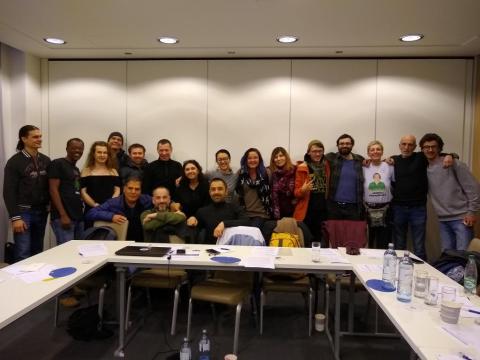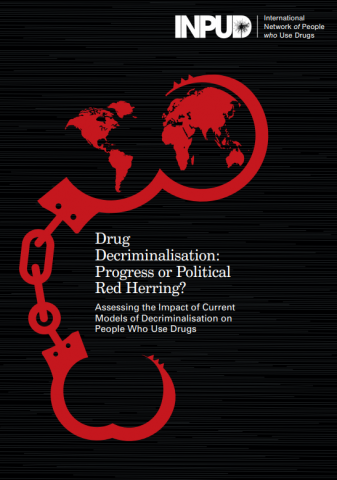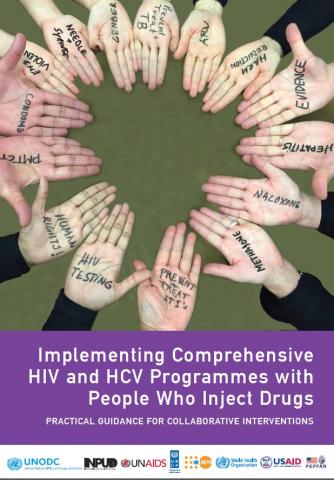What We Do

In line with the demands laid out in the Vancouver Declaration, INPUD seeks to promote the health and defend the human rights of people who drugs globally by challenging and exposing stigma, discrimination and the negative impacts of criminalisation on peers and communities. We primarily do this through amplifying and representing peers in global advocacy at international agencies such as the United Nations and those undertaking international development work, such as the Global Fund. Additionally we support the growth and development of national and regional peer networks engaged in advocacy, service delivery and community building. We believe people who use drugs must be meaningfully represented in the decision-making processes which affect our lives, and that peers posses unique insight through our lived experience which can be utilised to strengthen health services and harm reduction programmes.
Read the full INPUD Strategic Plan 2021-2024 here.
The following represent our core advocacy positions and examples of actions, publications or other documents we’ve produced to support this work. This list is not comprehensive, but comprises our key organisational positions which we feel are non-negotiable when it comes to seeking the highest attainable quality of life for people who use drugs.
Decriminalisation of all drugs

The criminalisation of drugs is the basis of most, if not all, systemic harms faced by people who use drugs globally. Criminalisation drives stigma, inequality, violence and rights deprivation for people who use drugs, and has been adopted as the standard approach to drug policy by most nations over the last century. The criminalisation of drugs has been historically tied to colonialism and ideas of racial or national superiority, being utilised by states throughout history to justify discrimination and violence against communities.
INPUD’s position on decriminalisation and what it means for us is laid out in Drug Decriminalisation: Progress or Political Red Herring?
Removing social & structural barriers to health

People who use drugs must have equitable access to high quality healthcare, Opioid Agonist Treatment (OAT) and other medications, HIV prevention and treatment, and harm reduction services and programmes which meaningfully involve peers and communities in central leadership roles. For too long health systems have emphasised criminalisation and social control over people who use drugs rather than our right to the highest attainable standard of health. Peers are frequently barred from accessing health services due to their drug use, coerced into involuntary treatment programs or subjected to punitive measures within health and harm reduction services such as compulsory urine testing, age limitations, non-consensual discharged, mandatory attendance, forced reductions and transfer refusals which do nothing but prevent people from participating in these programmes or receiving these crucial services. Criminalisation has forced many people who use drugs into unstable housing settings and unemployment while also spreading harmful stigma against drug use which makes it difficult for peers to find health professionals who can meet their needs. Racism, transphobia, homophobia, misogyny and other formers of hostility directed at key populations also compound these problems.
INPUD has a number of publications and advocacy resources centered around the right to health. In 2017 we co-authored the Injecting Drug User Implementation Tool (IDUIT) containing practical advice on implementing HIV and HCV programmes with people who inject drugs, and supported the rollout through a Training Manual. We have engaged in advocacy with the WHO and UNODC over revising the International Standards for the Treatment of Drug Use Disorders. We have published a technical brief on Universal Health Coverage (UHC) as it pertains to people who use drugs. Within all of this work we have also called for the meaningful involvement of peers in health, HIV and harm reduction services, as peer involvement has proven to strengthen the quality of health services.
Self-determination and meaningful involvement of people who use drugs
INPUD strongly believe in and supports the organisation of local, national and regional networks of people who use drugs. We provide technical assistance work closely with these networks on global advocacy, ensuring community perspectives are amplified to the highest levels of governance by supporting peer participation at global conferences, workshops and events.
Much of our advocacy work is built to sustain peer-led networks by advising on good governance practices as well as opening up and expanding funding streams from international agencies. This includes the Global Fund, where we work alongside peer networks to assess the meaningful engagement of people who use drugs in the Global Fund Country Coordinating Mechanisms. As the Global Fund has undertaken its new strategy review process, INPUD has worked with peer networks to ensure investments in communities of people who use drugs are maintained and grown. We have also called out instances where declines in funding have left communities quite literally out in the cold. In our advocacy to UN agencies such as UNAIDS, we have repeatedly emphasised the need to increase funding directed at peer-led health services, harm reduction programmes and advocacy.
In addition to advocacy we have also worked to amplify the voices and history of the movement of people who use drugs. In 2020, as part of HIV2020 Online and alongside Rights Reporter Foundation, we released Taking Back What’s Ours, a ten-part film series featuring the stories, histories and reflections of drug user advocates around the world. The series was supported through an accompanying research project drawing on accounts from 34 activists across the world.
As part of our work with the Consortium of Networks of People who Use Drugs, funded under the Robert Carr Foundation, we have worked alongside the Harm Reduction Consortium to produce NGOInABox, a new website which freely hosts documents and materials which can help any emerging peer network get started on good governance practices.
Responding to human rights abuses
Enforcing criminalisation leads states to commit a bevy of human rights abuses directed at people who use drugs and communities. INPUD seeks to respond to these violations in real time through consistent monitoring of countries where these abuses occur, as well as collecting regular input and data from peers and peer-led networks on the human rights situation in different countries or regions. When opportunities arise we work alongside peer networks to bring these issues to the attention of UN and national monitoring agencies and demand action be taken to address the harms. Our human rights positions can be found in our Consensus Statement on Drug Use Under Prohibition, which was developed in consultation with 24 peer-led organisations across 28 countries.
INPUD played a role in the development of the International Guidelines on Human Rights and Drug Policy by holding a consultation on human rights and drug policy with representatives of peer networks, the objective of which was to provide community input on the Guidelines. We emphasised the position that human rights must always take precedence over drug control. During the announcement of the Guidelines during the 62nd Commission on Narcotic Drugs, INPUD’s Executive Director Judy Chang spoke to the significance of including the inputs of drug user advocates who had been speaking for years on the importance of centering human rights in drug policy.
Some other examples of our human rights work:
- Joint submission with Recovering Nepal and the Indian Drug Users Forum to the UN Working Group on Arbitrary Detention
- Submission to the OHCHR’s report on UNGASS implementation and human rights
- Entreaty with ANPUD to halt the killings of people who use drugs in the Philippines
- Condemning the use of the death penalty against people for drug-related offences in Indonesia
- Joint letter urging action to prevent drug-related executions in Bahrain
Challenging stigma and discrimination in all forms
People who use drugs face immense stigma every day for simply living their lives. The intense rhetoric surrounding drug criminalisation has encouraged negative stereotypes and false perceptions about drugs and the people who use them, constructing a narrative which paint peers as morally flawed, inferior, unreliable or dangerous. As a result peers face immense social rejection, which can make it difficult to find employment, housing, social services and health programmes, including those offering HIV treatment or prevention. Though all people who use drugs face stigma in one form or another, people who inject drugs face an especially intense amount of stigma which too often denies them opportunities to meaningfully participate in advocacy, harm reduction programming or society as a whole. Stigma also leads to both legal and social discrimination, which can be amplified based on existing forms of discrimination such as those based on race, nationality, gender, religion, sexual identity or ableism to name a few. Drug prohibition has been particularly harmful towards people representing racial or ethnic minorities, indigenous communities, women and the LGBTQ+ community.
INPUD believes in challenging and calling out stigma and discrimination from all sources, including among other harm reduction or drug policy advocates. We have developed several tools to help peer networks do this, such as On the A-Gender, a community monitoring tool for gender-responsive harm reduction services. We have also published a report examining stigma and discrimination experienced by people who engage in chemsex. Importantly, we believe the language and words we use to talk about drugs and people who use them are often the source of stigma. As such we have co-published a guide along with ANPUD which references specific terminology preferred by peers and encourages others to use language which is non-judgemental and positively reinforced the rights of people who use drugs.
INPUD often works alongside and in solidarity with other key population networks, such as those representing sex workers, men who have sex with men and people living with HIV, to address broader trends of discrimination. Some of our key population network partners are: